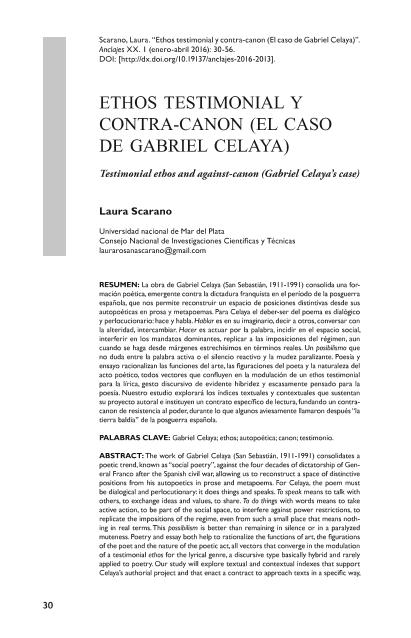Artículo
La obra de Gabriel Celaya (San Sebastián, 1911-1991) consolida una formación poética, emergente contra la dictadura franquista en el período de la posguerra española, que nos permite reconstruir un espacio de posiciones distintivas desde sus autopoéticas en prosa y metapoemas. Para Celaya el deber-ser del poema es dialógico y perlocucionario: hace y habla. Hablar es en su imaginario, decir a otros, conversar con la alteridad, intercambiar. Hacer es actuar por la palabra, incidir en el espacio social, interferir en los mandatos dominantes, replicar a las imposiciones del régimen, aun cuando se haga desde márgenes estrechísimos en términos reales. Un posibilismo que no duda entre la palabra activa o el silencio reactivo y la mudez paralizante. Poesía y ensayo racionalizan las funciones del arte, las figuraciones del poeta y la naturaleza del acto poético, todos vectores que confluyen en la modulación de un ethos testimonial para la lírica, gesto discursivo de evidente hibridez y escasamente pensado para la poesía. Nuestro estudio explorará los índices textuales y contextuales que sustentan su proyecto autoral e instituyen un contrato específico de lectura, fundando un contracanon de resistencia al poder, durante lo que algunos aviesamente llamaron después “la tierra baldía” de la posguerra española. The work of Gabriel Celaya (San Sebastián, 1911-1991) consolidates a poetic trend, known as “social poetry”, against the four decades of dictatorship of General Franco after the Spanish civil war, allowing us to reconstruct a space of distinctive positions from his autopoetics in prose and metapoems. For Celaya, the poem must be dialogical and perlocutionary: it does things and speaks. To speak means to talk with others, to exchange ideas and values, to share. To do things with words means to take active action, to be part of the social space, to interfere against power restrictions, to replicate the impositions of the regime, even from such a small place that means nothing in real terms. This possibilism is better than remaining in silence or in a paralyzed muteness. Poetry and essay both help to rationalize the functions of art, the figurations of the poet and the nature of the poetic act, all vectors that converge in the modulation of a testimonial ethos for the lyrical genre, a discursive type basically hybrid and rarely applied to poetry. Our study will explore textual and contextual indexes that support Celaya’s authorial project and that enact a contract to approach texts in a specific way, thereby formulating a contra-canon of resistance to power, during the period that some critics maliciously called “the waste land” of the Spanish post-civil war.
Ethos testimonial y contra-canon (el caso de Gabriel Celaya)
Título:
Testimonial ethos and against-canon (Gabriel Celaya's case)
Fecha de publicación:
03/2016
Editorial:
Universidad Nacional de La Pampa. Instituto de Investigaciones Literarias y Discursivas
Revista:
Anclajes
ISSN:
1851-4669
Idioma:
Español
Tipo de recurso:
Artículo publicado
Clasificación temática:
Resumen
Palabras clave:
Poesia Social
,
Ethos
,
Canon
,
Testimonio
Archivos asociados
Licencia
Identificadores
Colecciones
Articulos(CCT - MAR DEL PLATA)
Articulos de CTRO.CIENTIFICO TECNOL.CONICET - MAR DEL PLATA
Articulos de CTRO.CIENTIFICO TECNOL.CONICET - MAR DEL PLATA
Citación
Scarano, Laura Rosana; Ethos testimonial y contra-canon (el caso de Gabriel Celaya); Universidad Nacional de La Pampa. Instituto de Investigaciones Literarias y Discursivas; Anclajes; 20; 1; 3-2016; 35-61
Compartir
Altmétricas




